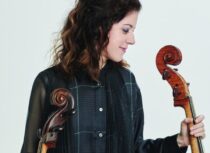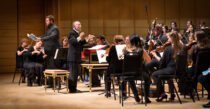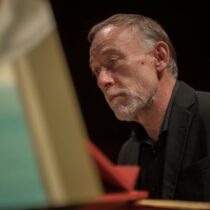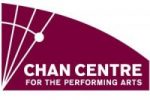Chan Centre for the Performing Arts
Elinor Frey, Cello; Pacific Baroque Orchestra; Alexander Weimann, Music Director
Of J.S. Bach’s children that survived into adulthood, four became composers whose music we still perform. While their musical facility reflects their father’s influence, each son had a very different path of travel, employment, and development of their musical voice. Johann Christian’s Chromatic Fugue on B-A-C-H pays homage to the serious, contrapuntal style of the past, but usually, the Bach sons write in the galant style of their own generation, characterized by simplicity and immediacy of appeal. The closeness of the Bachs sometimes complicates the attribution of their music. The Orchestral Suite in G minor, BWV 1070, once thought to be by father Johann Sebastian, was more likely written by Wilhelm Friedemann. The Cello Sonata in A Major of Johann Christoph Friedrich seems liberated, natural, and comprehensible when played on a cello fit with a fifth string whereas the Cello Concerto in A minor of his older brother, Carl Philipp Emanuel fits well on the more popular 4-string instrument. Each work demonstrates the language of Sensibility (Empfindsamkeit): intimate, sensitive, and subjective. In their music, emotions are fleeting and instantaneous and, above all, the beauty of melody is emphasized.
This concert is generously supported in memory of Vic Baker
Please note, this concert will be filmed
Programme
WILHELM FRIEDEMANN BACH (1710-1784)
BWV 1070 Suite for orchestra in g minor
Larghetto – Un poco allegro
Torneo
Aria
Menuetto
Capriccio
JOHANN CHRISTOPH FRIEDRICH BACH (1732-1795)
Sonata for cello and basso continuo in A major
Larghetto
Allegro
Tempo di Minuetto
JOHANN CHRISTIAN BACH (1735-1782)
Chromatic Fugue on B-A-C-H in F major for keyboard solo
CARL PHILLIPP EMANUEL BACH (1714-1788)
Concerto for violoncello, strings, and basso continuo in A minor, [H. 432]
Allegro assai
Andante
Allegro assai
Programme Notes
The four sons of Johann Sebastian Bach had long careers as professional musicians, each unique in their musical output and personal character. In his lifetime, the eldest son (and sometimes named favourite?), Wilhelm Friedmann Bach (1710-1784), achieved some measure of success through official posts in Dresden and Halle as an organist and built a reputation as a brilliant improviser. The end of his life was spent in Berlin somewhat floundering as a performer, barely active as a composer. The royal courts of mid-eighteenth century Berlin were lively crossroads for some of the greatest musicians of the time. Court musicians and visitors were famous virtuosos performing music full of expressivity and fantasy. It is in this context that the second-eldest, Carl Philipp Emmanuel Bach (1714-1788), found a thriving career as a keyboard player and composer before succeeding his godfather, Telemann, as Kapellmeister in Hamburg. Emmanuel Bach kept in close contact with his two half-brothers, Johann Christoph Friedrich Bach (1732-1795), longtime Konzertmeister of the Bückeburg Hofkapelle, and the youngest of the four, Johann Christian Bach (1735-1782), who is known for his career in London but first moved to Berlin to study and live with his brother after the death of their father, Johann Sebastian, in 1750.
His half-brother Johann Christoph Friedrich’s Cello Sonata in A Major also exhibits many hallmarks of the Galant and also the correlated Empfindsamer stil, calling for various changes in dynamic, both abrupt and subtle, at the service of beautiful melodies and expressive fantasy. Friedrich’s close association with his brother, Carl Philipp Emmanuel, is evidenced by the printing of the sonata in the latter’s Musikalisches Vierlerley of 1770, a kind of subscription-based publication of various chamber works from well-known composers such as Graun, Fasch, and Kirnberger. This Sonata in A Major follows the Slow-Fast-Fast form which O’Loghlin calls the “Berlin sonata schema” in which the opening movement is long and substantial and ends with a cadenza. The five-string cello particularly supports passagework using a pedal on the open E-string. Indeed, many mid-18th century sonatas for cello seem liberated, natural, and comprehensible when played on an instrument fitted with a fifth string, even if this instrument was not named in the score. The most famous example of 18th-century music that expressly calls for a 5-string cello is J.S. Bach’s sixth suite.
- Elinor Frey

Elinor Frey, Cello
Elinor Frey is a leading Canadian-American cellist, gambist, and researcher. Her albums on the Belgian label Passacaille and Canadian label Analekta – many of which are world premiere recordings – are the fruit of long collaborations with artists such as Suzie LeBlanc, Marc Vanscheeuwijck, and Lorenzo Ghielmi, as well as with composers including Maxime McKinley, Linda Catlin Smith, Christian Mason, and Lisa Streich. Elinor’s recording of cello sonatas by Giuseppe Clemente Dall’Abaco received a Diapason d’Or and her critical editions of Dall’Abaco’s cello music is published in collaboration with Walhall Editions. Early Italian Cello Concertos, her album in collaboration with Rosa Barocca orchestra, won the 2023 JUNO Award for Classical Album of the Year (small ensemble).
Elinor is the artistic director of Accademia de’ Dissonanti, an organization for performance and research, and she has performed throughout the Americas and in Europe in recital and with numerous chamber ensembles and orchestras (Constantinople, Les idées heureuses, Il Gardellino, Tafelmusik, Pacific Baroque Orchestra, etc.). In March 2023, she performed Boccherini and Sammartini concertos with the Australian Brandenburg Orchestra.
Recipient of dozens of grants and prizes supporting performance and research, including the US-Italy Fulbright Fellowship (studying with Paolo Beschi in Como, Italy) and a recent research residency at the Orpheus Institute in Ghent, Elinor holds degrees from McGill, Mannes, and Juilliard. She teaches Baroque cello and performance practice at McGill University and the Université de Montréal and is a Visiting Fellow in Music (2020–2023) at Lady Margaret Hall, Oxford University. Frey was awarded Québec’s Opus Prize for “Performer of the Year” in 2021.

Pacific Baroque Orchestra
The ‘house band’ of Early Music Vancouver, The Pacific Baroque Orchestra (PBO) is recognized as one of Canada’s most exciting and innovative ensembles performing “early music for modern ears.” Formed in 1990, the orchestra quickly established itself as a force in Vancouver’s burgeoning music scene with the ongoing support of Early Music Vancouver. In 2009, PBO welcomed Alexander Weimann as Director. His imaginative programming, creativity and engaging musicianship have carved out a unique and vital place in the cultural landscape of Vancouver.
PBO regularly joins forces with internationally-celebrated Canadian guest artists, providing performance opportunities for Canadian musicians while exposing West Coast audiences to a spectacular variety of talent. The Orchestra has also toured throughout BC, the northern United States, and across Canada. Their 2019 East Coast Canadian tour with Canadian soprano Karina Gauvin culminated in a critically acclaimed album, Nuit Blanches, released by Atma Classique.

Alexander Weimann, Music Director
Alexander Weimann is one of the most sought-after ensemble directors, soloists, and chamber music partners of his generation. After travelling the world with ensembles such as Tragicomedia, Cantus Cölln, the Freiburger Barockorchester, Gesualdo Consort and Tafelmusik, he now focuses on his activities as Music Director of the Pacific Baroque Orchestra in Vancouver, Music Director of the Seattle Baroque Orchestra, and regular guest conductor of ensembles including the Victoria Symphony, Symphony Nova Scotia, Arion Baroque Orchestra in Montreal and the Portland Baroque Orchestra.
Alex was born in Munich, where he studied the organ, church music, musicology (with a summa con laude thesis on Bach’s secco recitatives), theatre, mediæval Latin, and jazz piano, supported by a variety of federal scholarships. From 1990 to 1995, he taught music theory, improvisation, and Jazz at the Munich Musikhochschule. Since 1998, he has been giving master classes in harpsichord and historical performance practice at institutions such as Lunds University in Malmö, the Bremen Musikhochschule, the University of California (Berkeley), Dartmouth College (New Hampshire), McGill University, Université de Montréal, and Mount Allison (New Brunswick). He now teaches at the University of British Columbia and directs the Baroque Orchestra Mentorship Programme there. He has received several JUNO and GRAMMY Award nominations – most recently, for the album Nuit Blanches with the Pacific Baroque Orchestra and Karina Gauvin.



